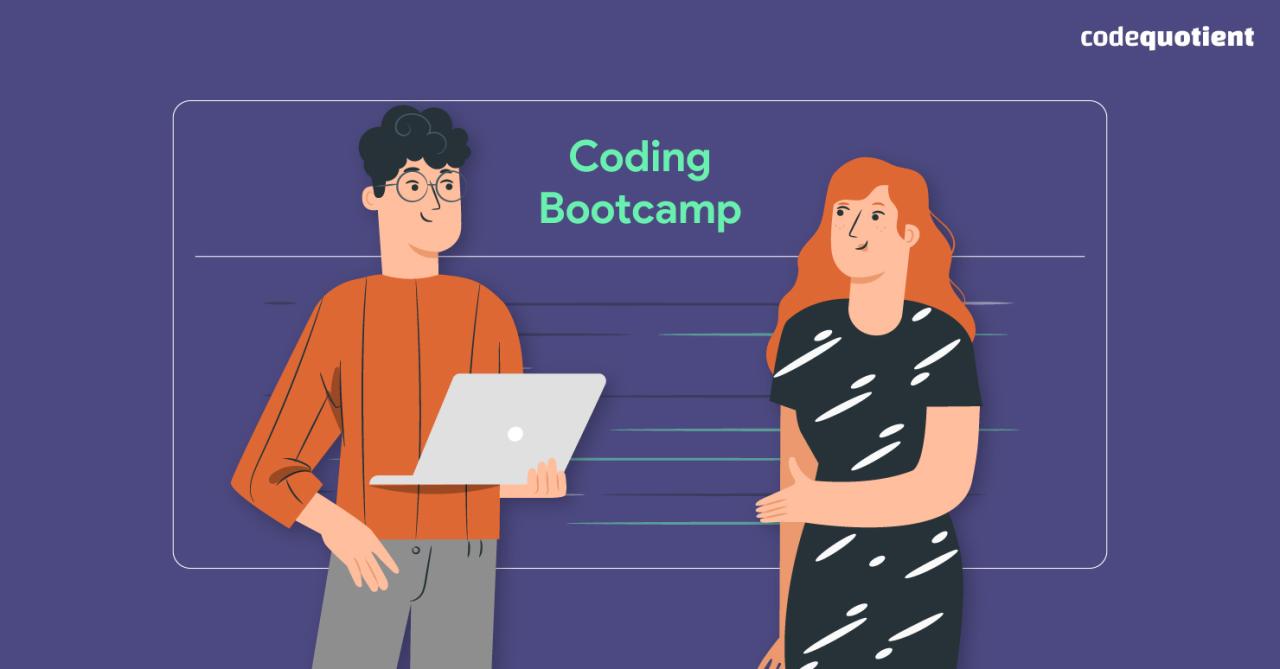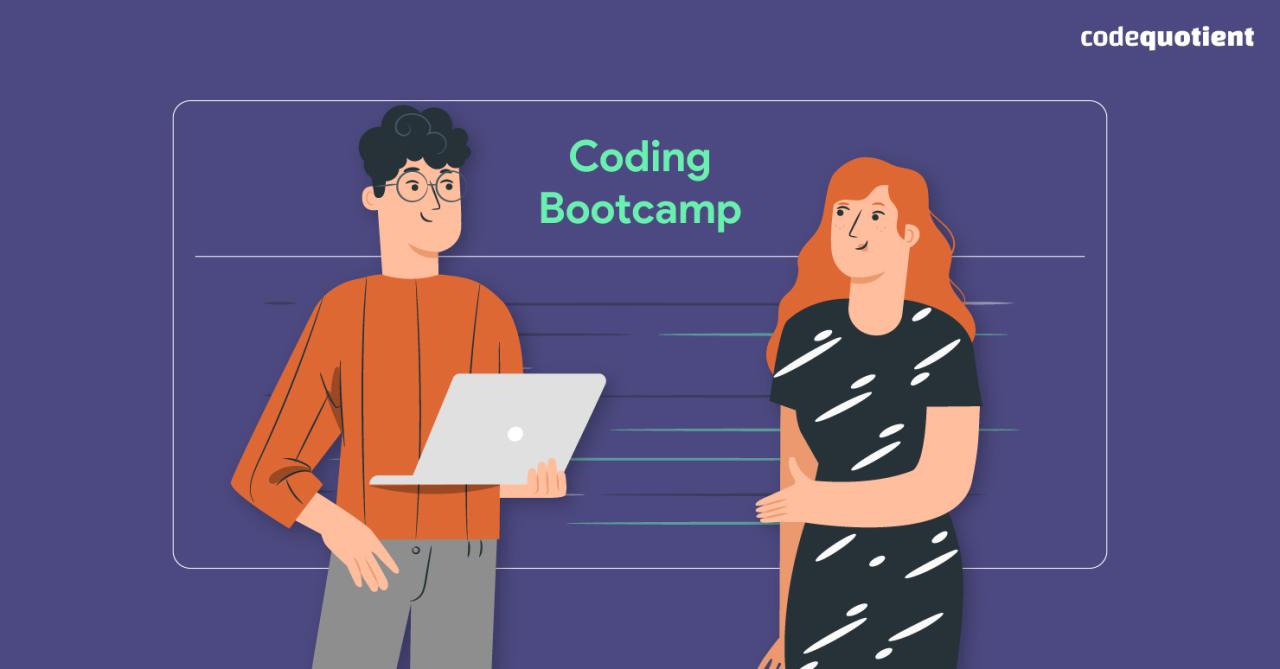Bootcamp Selection Criteria

Choosing the right coding bootcamp is a crucial step in your journey to a new career. The abundance of options available can be overwhelming, but careful consideration of several key factors will significantly improve your chances of success. This section will guide you through the process of evaluating different bootcamp types and making an informed decision.
Bootcamp Types: Full-Time, Part-Time, Online, and In-Person
Different bootcamps cater to various learning styles and schedules. Full-time bootcamps offer an immersive, intensive learning experience, typically lasting 3-6 months. This format allows for rapid skill acquisition and strong cohort bonding. Part-time bootcamps, on the other hand, are designed for those who need more flexibility, often extending over 6-12 months or longer. The extended timeframe allows for better work-life balance but may require more self-discipline. Online bootcamps offer accessibility regardless of geographical location, but require significant self-motivation and discipline. In-person bootcamps provide the benefit of direct interaction with instructors and peers, fostering a collaborative learning environment. The best choice depends on your individual circumstances, learning preferences, and time commitment.
Bootcamp Comparison Table
The following table compares various aspects of different bootcamp formats. Note that these are general estimates, and actual costs and durations can vary significantly depending on the specific bootcamp and location.
| Bootcamp Type | Estimated Cost (USD) | Duration | Curriculum Focus |
|---|---|---|---|
| Full-Time In-Person | $10,000 – $20,000 | 3-6 months | Web Development, Data Science, UX/UI Design |
| Part-Time In-Person | $8,000 – $15,000 | 6-12 months | Web Development, Data Science |
| Full-Time Online | $7,000 – $18,000 | 3-6 months | Web Development, Data Science, Cybersecurity |
| Part-Time Online | $6,000 – $12,000 | 6-18 months | Web Development, Data Analysis |
Researching Bootcamp Instructors and Their Experience
Thorough research into the instructors’ qualifications and experience is paramount. Instructors with relevant industry experience and a proven track record of student success can significantly impact your learning experience and job placement prospects. Look for instructors with strong portfolios, positive student reviews, and a history of successful graduates.
Questions to Ask Potential Bootcamps
Prospective students should inquire about instructor qualifications, career services support, curriculum details, and student success rates. For example, asking about the average salary of graduates, the percentage of graduates who find jobs within a certain timeframe, and the specific technologies taught in the curriculum provides valuable insight. Additionally, inquiring about the availability of mentorship programs and networking opportunities will help assess the bootcamp’s overall support system.
Financial Planning & Resources: What To Know Before Coding Bootcamp
Coding bootcamps represent a significant investment of time and money. Thorough financial planning is crucial to ensure a successful and stress-free learning experience. Failing to account for all costs can lead to significant financial strain and potentially derail your career goals. This section Artikels essential financial considerations and resources to help you navigate this process effectively.
Realistic Bootcamp Budget
A realistic budget must encompass tuition fees, living expenses, and potential income loss. Tuition fees vary widely depending on the bootcamp, location, and program length. Expect to pay anywhere from $10,000 to $20,000 or more for an immersive program. Living expenses, including rent, utilities, food, and transportation, should be carefully estimated based on your chosen bootcamp location. For example, a bootcamp in a major city like San Francisco will have significantly higher living costs than one in a smaller town. Finally, account for potential income loss during the bootcamp duration. Many students quit their jobs to attend full-time programs, meaning they will have no income for several months. A comprehensive budget should include a buffer for unexpected expenses. For instance, a sample budget for a three-month bootcamp in a mid-sized city might look like this: Tuition: $15,000, Living Expenses (rent, utilities, food, transportation): $9,000, Loss of Income (3 months average salary): $12,000, Emergency Fund: $2,000. Total: $38,000. This is just an example, and your specific costs will vary.
Applying for Financial Aid and Scholarships
Securing financial aid or scholarships can significantly reduce the overall cost of a bootcamp. Begin by exploring the bootcamp’s own financial aid options. Many bootcamps offer payment plans, income share agreements (ISAs), or scholarships. Next, research external scholarships specifically for coding bootcamp students. Numerous organizations, including tech companies and non-profits, offer scholarships based on merit, need, or specific demographics. Online scholarship databases, such as Scholarships.com and Fastweb, can be invaluable resources. The application process typically involves completing an application form, providing transcripts or resumes, and writing personal essays. Maintain organized records of all applications and deadlines. Be prepared to demonstrate financial need through documentation like tax returns and bank statements. Finally, consider government-sponsored student loan programs, if applicable.
Financing Options
Several financing options exist to cover bootcamp costs. Personal savings are the most straightforward option. However, many students rely on loans, either through private lenders or government-backed programs. Private lenders offer various loan options with varying interest rates and repayment terms. Compare interest rates, fees, and repayment schedules carefully before choosing a lender. Government-backed loans, such as federal student loans (if eligible), might offer lower interest rates and more flexible repayment plans. Income share agreements (ISAs) are another option. With an ISA, you agree to pay a percentage of your income after graduation for a set period, instead of paying a lump sum upfront. This option can be attractive if you are confident in your ability to secure a well-paying job after the bootcamp.
Resources for Affordable Housing
Finding affordable housing near your chosen bootcamp is crucial. Start by researching the average rent prices in the area and setting a realistic budget. Explore various housing options, such as apartments, shared housing, and sublets. Online resources like Craigslist, Zillow, Apartments.com, and Trulia can help you find available listings. Consider networking with current or former bootcamp students for recommendations or leads on affordable housing options. Local community groups and Facebook groups can also provide valuable insights and potential connections. Finally, explore options outside the immediate vicinity of the bootcamp, if feasible, to find more affordable housing further from the city center.
Time Commitment & Lifestyle Adjustments

Coding bootcamps are intensive programs demanding a significant time commitment. Success requires dedication and careful planning to balance the rigorous curriculum with existing personal and professional responsibilities. Underestimating this aspect can lead to burnout and ultimately hinder your learning experience.
The typical coding bootcamp involves a full-time commitment, often exceeding 40 hours per week. This includes scheduled classes, independent study, homework assignments, and the crucial development of personal projects to build your portfolio. Expect to dedicate several hours each evening and most weekends to your studies. The intensity varies depending on the bootcamp’s structure and your learning pace, but consistent effort is paramount.
Balancing Bootcamp Demands
Successfully navigating a coding bootcamp while maintaining a healthy work-life balance requires proactive planning and effective time management strategies. Many students juggle full-time jobs, family responsibilities, and social commitments alongside their studies. Prioritizing tasks, setting realistic goals, and seeking support are vital for success.
Time Management Strategies
Effective time management is crucial for bootcamp success. Creating a detailed weekly schedule, breaking down large tasks into smaller, manageable steps, and utilizing time-blocking techniques can significantly improve productivity and reduce stress. Prioritize tasks based on urgency and importance, and allocate specific time slots for each activity, including study time, personal projects, work, family time, and relaxation. Regularly review and adjust your schedule as needed to adapt to changing demands.
Stress Reduction Techniques
The intensive nature of a coding bootcamp can be stressful. Implementing stress-reduction techniques is essential for maintaining mental and physical well-being. Regular exercise, mindfulness practices like meditation or yoga, sufficient sleep, and a healthy diet are crucial for managing stress levels and improving focus. Connecting with fellow students and seeking support from instructors or mentors can also provide valuable emotional support and reduce feelings of isolation. Remember to schedule dedicated time for relaxation and activities you enjoy to prevent burnout.
Sample Weekly Schedule
This is a sample schedule and should be adapted to your specific circumstances and priorities. Remember that flexibility is key.
| Day | Morning | Afternoon | Evening | Weekend |
|---|---|---|---|---|
| Monday | Bootcamp Classes (9am-1pm) | Independent Study/Homework (2pm-5pm) | Personal Project/Study (7pm-9pm) | Personal Projects/Relaxation |
| Tuesday | Bootcamp Classes (9am-1pm) | Independent Study/Homework (2pm-5pm) | Personal Project/Study (7pm-9pm) | Personal Projects/Relaxation |
| Wednesday | Bootcamp Classes (9am-1pm) | Independent Study/Homework (2pm-5pm) | Family Time/Relaxation | |
| Thursday | Bootcamp Classes (9am-1pm) | Independent Study/Homework (2pm-5pm) | Personal Project/Study (7pm-9pm) | |
| Friday | Bootcamp Classes (9am-1pm) | Independent Study/Homework (2pm-5pm) | Relaxation/Social Time |
Understanding the Learning Environment

Coding bootcamps offer a unique and intense learning environment designed to rapidly equip students with in-demand tech skills. The atmosphere is typically collaborative, fast-paced, and highly demanding, requiring significant dedication and self-discipline. Success hinges on adapting to this environment and leveraging its inherent advantages.
The intensity is a defining characteristic. Expect long hours of study, frequent assignments, and a constant stream of new concepts. This pace, while challenging, is intended to foster rapid skill acquisition and prepare you for the demands of a professional software development role.
Teaching Methodologies in Coding Bootcamps, What to know before coding bootcamp
Bootcamps employ a variety of teaching methodologies, often blending different approaches to maximize learning effectiveness. Two common methods are project-based learning and lecture-based instruction. Project-based learning immerses students in real-world projects from the outset, allowing them to apply newly acquired knowledge immediately. This hands-on approach fosters problem-solving skills and builds a practical portfolio. In contrast, lecture-based instruction provides a structured foundation of theoretical knowledge, often supplemented with practical exercises. Many bootcamps successfully integrate both methods, using lectures to introduce core concepts and projects to reinforce understanding and build practical experience. For example, a bootcamp might introduce web development concepts through lectures and then immediately have students build a simple website as a project.
The Importance of Peer and Instructor Support
The collaborative nature of bootcamps is a crucial aspect of the learning experience. Regular interaction with instructors and peers is vital for success. Instructors provide expert guidance, answer questions, and offer feedback on projects. Peers, meanwhile, offer a supportive learning community, facilitating knowledge sharing, collaborative problem-solving, and mutual encouragement. The ability to effectively seek and utilize support from both instructors and fellow students is a key factor in navigating the challenges of an intensive bootcamp. A strong support network can help overcome obstacles, improve understanding of complex concepts, and maintain motivation throughout the program.
Strategies for Effective Learning and Knowledge Retention
The intensive nature of bootcamps necessitates effective learning strategies to maximize knowledge retention. Consistent study habits are crucial. This includes regular review of materials, active participation in class, and dedicated time for independent practice. Active recall techniques, such as self-testing and explaining concepts to others, significantly enhance memory and understanding. Breaking down large tasks into smaller, manageable steps helps prevent feeling overwhelmed. Effective time management is paramount, necessitating a realistic schedule that balances study, projects, and personal life. Finally, seeking feedback regularly from instructors and peers provides valuable insights and helps identify areas needing improvement. Utilizing resources like online forums and collaborative coding platforms can further enhance the learning experience.


Tim Redaksi